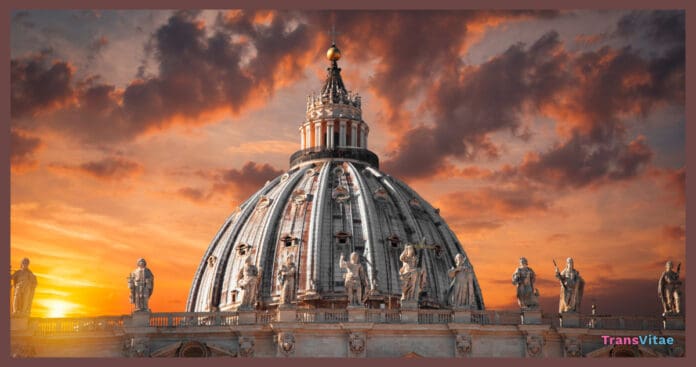In a recent development that has reverberated through the transgender community, especially among those of faith, the Vatican issued a document steadfastly rejecting the idea of changing one’s biological sex. This declaration has left many transgender Catholics and their allies in a state of disappointment and dismay.
The document, while reiterating longstanding Catholic teachings, has struck a chord, particularly because of Pope Francis’s previous actions, which had kindled hopes of a more inclusive approach by the Church towards transgender individuals.
Pope Francis, known for his compassionate outreach, had notably welcomed a group of transgender women to his weekly general audiences and even affirmed the eligibility of trans people for baptism and serving as godparents under specific conditions last year. These gestures had fostered a glimmer of hope among trans Catholics for greater acceptance within the Church.
Maxwell Kuzma, a 32-year-old transgender man from rural Ohio, expressed his pain over the Vatican’s stance. Kuzma, a lifelong Catholic and working professional in the film industry, perceived the Church’s most recent stance as a betrayal in contrast to the Pope’s earlier acts of kindness. “The care and love Pope Francis has shown personally to the trans community starkly contrasts with the lack of respect, love, and support reflected in this document,” Kuzma remarked.
The absence of the term “transgender” in the Vatican’s document was particularly troubling for Michael Sennett, an active member of an LGBTQ+ ministry in Massachusetts. Sennett argued that failing to explicitly acknowledge transgender people undermines their dignity and the Church’s capacity to engage with them pastorally. He countered the document’s implication that trans individuals seeking to align their bodies with their gender identity were in defiance of divine creation. “Transgender people are as much beloved creations of God as cisgender individuals,” Sennett stated, emphasizing the life-saving aspect of transition-related care.
Equally disconcerted, Christine Zuba, a transgender woman from New Jersey, criticized the document for equating gender-affirming surgery with global crises such as war and human trafficking. She feared the document’s language would embolden those who deny the existence and rights of transgender individuals. Zuba highlighted the contradiction inherent in the Church’s message: acknowledging the dignity of transgender people while simultaneously denying it through such declarations.
Amidst this backdrop of varied reactions, some voices within the Catholic community in the U.S. offer hope. The Church’s stance on transgender issues is not uniform across the board, with certain dioceses and parishes exhibiting more welcoming attitudes. The Church of Our Lady of Grace in Hoboken, New Jersey, under the leadership of Rev. Alexander Santora, stands as a beacon of inclusivity, having invited Zuba to contribute to a homily during its annual Pride Mass.
Rev. Santora, while acknowledging some positive aspects of the Vatican document, such as its stance against criminalizing homosexuality, voiced concern over the potential harm the document’s tone could inflict on transgender individuals. He advocated for the involvement of devout trans Catholics in discussions on the document to foster a more pastoral approach.
The recent Vatican document has undoubtedly cast a shadow over the hopes of many transgender Catholics. However, figures like Kuzma remain hopeful, viewing the current attention on transgender issues as an opportunity for recognition and acceptance. “The Catholic Church moves slowly, but my hope is that it will one day fully appreciate the unique contributions transgender people offer to the church and the world,” Kuzma shared.
As the Church grapples with modernity and inclusivity, the voices of transgender Catholics like Kuzma, Sennett, and Zuba serve as poignant reminders of the ongoing struggle for acceptance and recognition within their faith community. Their experiences and viewpoints highlight the intricate interplay between custom and the developing understanding of gender identity, calling for a path forward that is inclusive, understanding, and compassionate.


